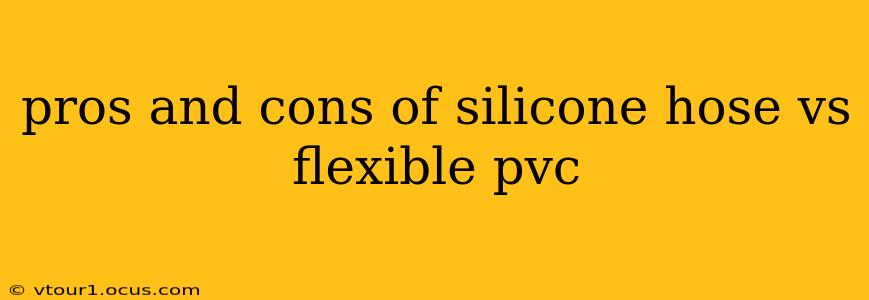Choosing the right tubing for your application can be crucial, and the decision often comes down to silicone hose versus flexible PVC. Both offer flexibility, but their properties differ significantly, leading to distinct advantages and disadvantages in various contexts. This in-depth comparison will help you make an informed decision.
What are the key differences between silicone hose and flexible PVC?
The core difference lies in the materials themselves. Silicone is a synthetic polymer known for its heat resistance, flexibility, and inertness. Flexible PVC (polyvinyl chloride) is another common polymer, but it's less heat-resistant and possesses different chemical properties. This fundamental difference impacts their performance across various applications.
Silicone Hose: Pros and Cons
Pros:
- High Temperature Resistance: Silicone hoses can withstand significantly higher temperatures than PVC, often exceeding 400°F (204°C) depending on the specific formulation. This makes them ideal for high-heat applications like automotive systems, industrial processes, and certain medical devices.
- Excellent Flexibility and Durability: Silicone remains flexible even at extreme temperatures, unlike PVC which can become brittle. They also tend to be more resistant to tearing and abrasion.
- Chemical Inertness: Silicone is generally inert to many chemicals, making it suitable for applications involving corrosive substances.
- Food-Safe Options Available: Some silicone hoses are certified food-safe, suitable for applications in the food and beverage industry.
- Withstands UV Exposure: Silicone hoses tend to resist degradation from ultraviolet (UV) light exposure, making them suitable for outdoor applications.
Cons:
- Higher Cost: Silicone hoses are generally more expensive than PVC hoses.
- Permeability to Some Gases: While inert to many chemicals, silicone can be permeable to certain gases, which might be a concern in specific applications.
- Less Resistant to Puncture: Compared to reinforced PVC, silicone can be more susceptible to punctures.
Flexible PVC Hose: Pros and Cons
Pros:
- Lower Cost: Flexible PVC hoses are significantly cheaper than silicone hoses.
- Widely Available: PVC tubing is readily available in various sizes and configurations.
- Good Chemical Resistance (to Certain Chemicals): PVC offers good resistance to a range of chemicals, though not as broad a range as silicone.
- Easy to Work With: PVC tubing is relatively easy to cut and assemble.
Cons:
- Lower Temperature Resistance: PVC hoses are not suitable for high-temperature applications, typically failing at temperatures well below those that silicone can withstand.
- Brittle at Low Temperatures: PVC can become brittle and prone to cracking at lower temperatures.
- Limited Chemical Resistance: While resistant to many chemicals, PVC is not suitable for use with strong acids, bases, or certain solvents.
- Less Durable: PVC is generally less durable than silicone, more prone to cracking and wear over time, particularly with exposure to UV light.
Which is better for automotive applications?
For automotive applications, silicone hose is generally preferred due to its superior heat resistance and durability. Engine bays experience extreme temperature fluctuations, and silicone hoses can better handle these conditions. However, the cost needs to be considered. PVC might be suitable for lower-temperature applications within the vehicle.
Which is better for food and beverage applications?
For food and beverage applications, food-grade silicone hose is the preferred choice. It offers the necessary chemical inertness and temperature resistance to ensure product safety and maintain hygiene. It’s crucial to verify that the silicone tubing is certified for food contact. PVC should be avoided in these applications.
Which is better for industrial applications?
The choice for industrial applications depends heavily on the specific application. Silicone is favored where high temperatures or aggressive chemicals are involved. However, the cost-effectiveness of PVC might make it suitable for some industrial applications with less demanding requirements.
Which material is more environmentally friendly?
Both silicone and PVC have environmental impacts. PVC's production and disposal pose greater environmental concerns due to the release of dioxins and other harmful substances. Silicone's environmental impact is generally considered less severe, but responsible disposal is still necessary for both materials.
By carefully considering these pros and cons and the specific demands of your application, you can make an informed decision between silicone hose and flexible PVC, ensuring optimal performance and safety. Remember to always consult the manufacturer's specifications to confirm suitability for your particular requirements.
